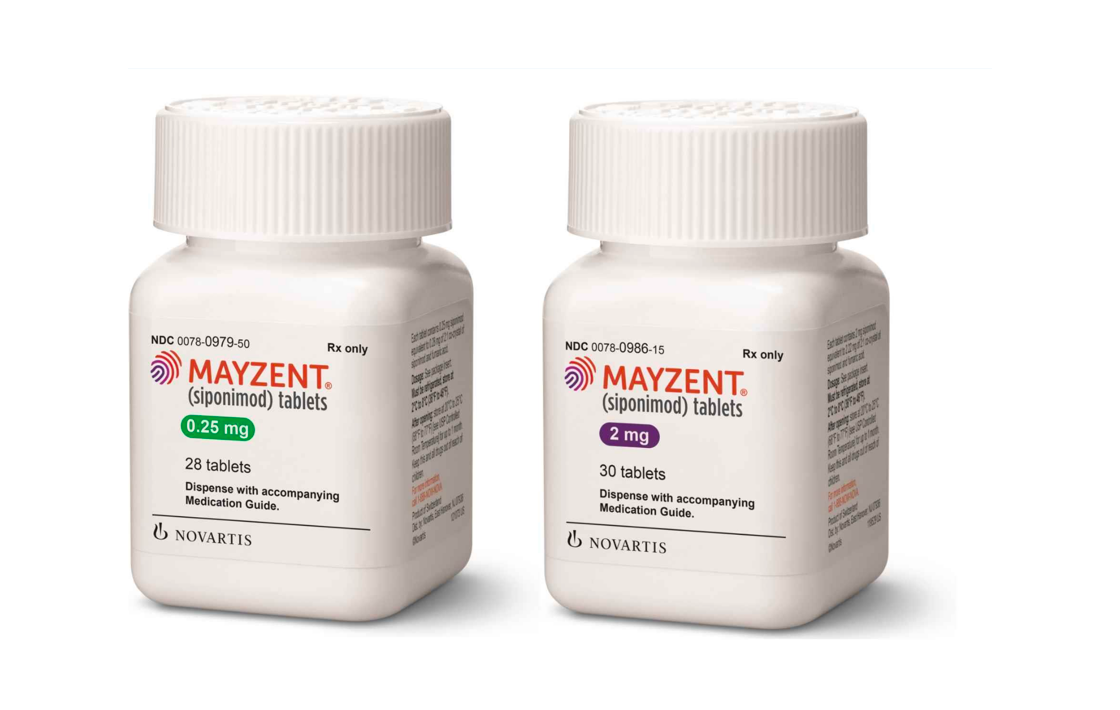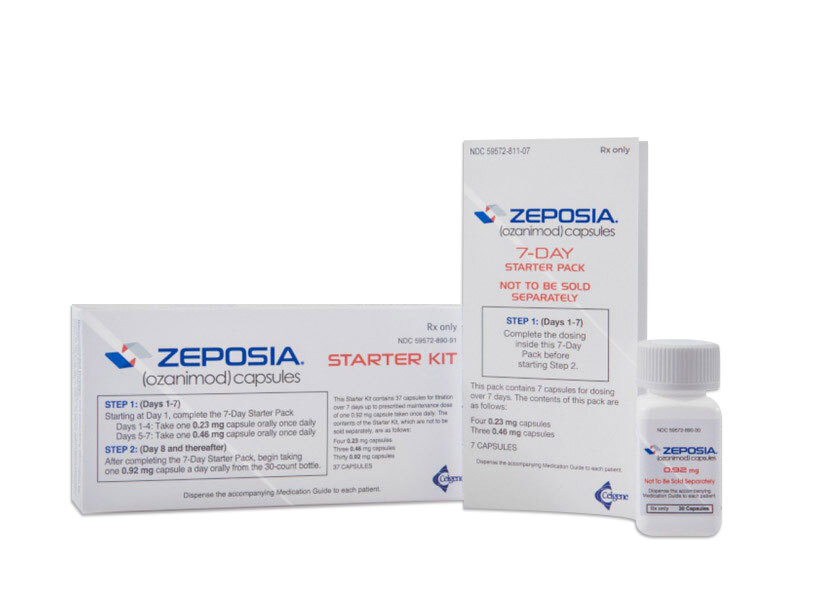Mayzent (Siponimod) vs Zeposia (ozanimod)
Mayzent (Siponimod) vs Zeposia (ozanimod)
Mayzent (Siponimod) and Zeposia (Ozanimod) are both oral sphingosine 1-phosphate (S1P) receptor modulators used to treat multiple sclerosis (MS), but they have differences in their receptor specificity and indications. Mayzent is specifically approved for secondary progressive MS (SPMS) with active disease, clinically isolated syndrome (CIS), and relapsing-remitting MS (RRMS), and has a requirement for genetic testing before initiation to determine dosage. Zeposia, on the other hand, is approved for relapsing forms of MS, including RRMS, active SPMS, and CIS, and does not require genetic testing prior to starting treatment, but does require a first dose observation for signs of heart rate decrease. When deciding which medication is right for an individual, factors such as the specific type of MS, potential side effects, drug-drug interactions, and the need for genetic testing or first dose observation should be considered in consultation with a healthcare provider.
Difference between Mayzent and Zeposia
| Metric | Mayzent (Siponimod) | Zeposia (ozanimod) |
|---|---|---|
| Generic name | Siponimod | ozanimod |
| Indications | Relapsing forms of multiple sclerosis | Relapsing forms of multiple sclerosis, Ulcerative colitis |
| Mechanism of action | Sphingosine 1-phosphate receptor modulator | Sphingosine 1-phosphate receptor modulator |
| Brand names | Mayzent | Zeposia |
| Administrative route | Oral | Oral |
| Side effects | Headache, hypertension, liver transaminase elevation | Upper respiratory infection, hepatic enzyme elevation, orthostatic hypotension |
| Contraindications | CYP2C9*3/*3 genotype, recent myocardial infarction, stroke | Recent myocardial infarction, unstable angina, stroke |
| Drug class | Sphingosine 1-phosphate receptor modulator | Sphingosine 1-phosphate receptor modulator |
| Manufacturer | Novartis | Bristol Myers Squibb |
Efficacy
Efficacy of Mayzent (Siponimod) in Multiple Sclerosis
Mayzent (Siponimod) is a medication approved for the treatment of multiple sclerosis (MS), specifically for relapsing forms of the disease, which include clinically isolated syndrome, relapsing-remitting disease, and active secondary progressive disease. The efficacy of Mayzent was demonstrated in a pivotal phase III clinical trial known as EXPAND. In this study, Mayzent significantly reduced the risk of disease progression, including delays in disability progression that were sustained for three and six months. The medication also showed a reduction in the annualized relapse rate (ARR) compared to placebo, which is a common measure of disease activity in MS.
Moreover, Mayzent has been found to have a favorable impact on other markers of disease activity. It has been associated with a reduction in the number of new or enlarging T2 lesions and gadolinium-enhancing lesions on MRI scans, which are indicative of new areas of inflammation in the brain and spinal cord. These effects suggest that Mayzent can help control the inflammatory activity associated with MS and potentially slow down the accumulation of neurological damage over time.
Efficacy of Zeposia (Ozanimod) in Multiple Sclerosis
Zeposia (Ozanimod) is another oral medication approved for the treatment of relapsing forms of multiple sclerosis, including clinically isolated syndrome, relapsing-remitting MS, and active secondary progressive MS. The efficacy of Zeposia was established through two key phase III clinical trials, RADIANCE and SUNBEAM. In these trials, Zeposia demonstrated a significant reduction in the annualized relapse rate compared to interferon beta-1a, a commonly used treatment for MS. Patients treated with Zeposia also experienced fewer relapses and a lower number of new or enlarging T2 lesions on MRI.
In addition to the reduction in relapse rate and lesion activity, Zeposia has shown benefits in slowing the progression of disability. The trials indicated that Zeposia could delay the time to confirmed disability progression. This is a critical aspect of treating MS, as it can help maintain patients' neurological function and quality of life. Furthermore, Zeposia has been associated with a favorable safety and tolerability profile, which is an important consideration in the long-term management of MS.
Regulatory Agency Approvals
Mayzent
-
European Medical Agency (EMA), European Union

-
Food and Drug Administration (FDA), USA

-
Therapeutic Goods Administration (TGA), Australia

Zeposia
-
European Medical Agency (EMA), European Union

-
Food and Drug Administration (FDA), USA

-
Health Canada

-
Therapeutic Goods Administration (TGA), Australia

Access Mayzent or Zeposia today
If Mayzent or Zeposia are not approved or available in your country (e.g. due to supply issues), you can access them via Everyone.org.
How it works

Make an enquiry
Choose the medicine you want to buy, answer a couple of questions, and upload your prescription to speed things up. We’ll get back to you within 24 hours.


Make an enquiry
Choose the medicine you want to buy, answer a couple of questions, and upload your prescription to speed things up. We’ll get back to you within 24 hours.


Breeze through the paperwork
We'll guide you through the required documents for importing unapproved medicine, ensuring you have all the necessary information.


Get a personalized quote
We’ll prepare a quote for you, including medicine costs and any shipping, administrative, or import fees that may apply.


Receive your medicine
Accept the quote and we’ll handle the rest - sourcing and safely delivering your medicine.

Some text on this page has been automatically generated. Speak to your physician before you start a new treatment or medication.
Let's talk
If you have any questions, call us or send us a message through WhatsApp or email:
Contact us




